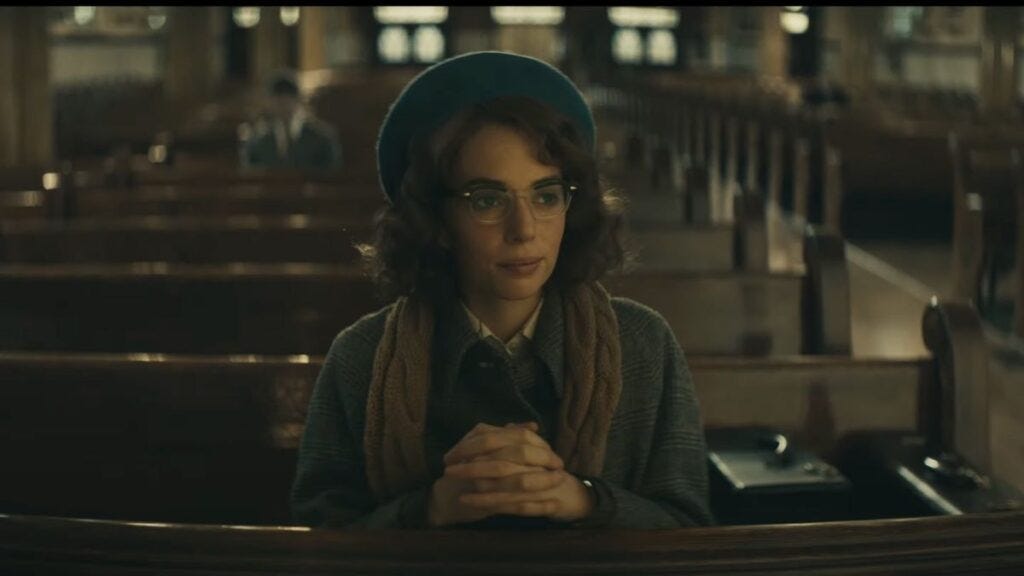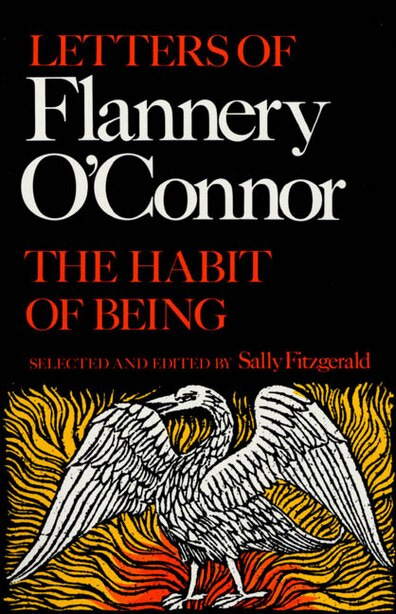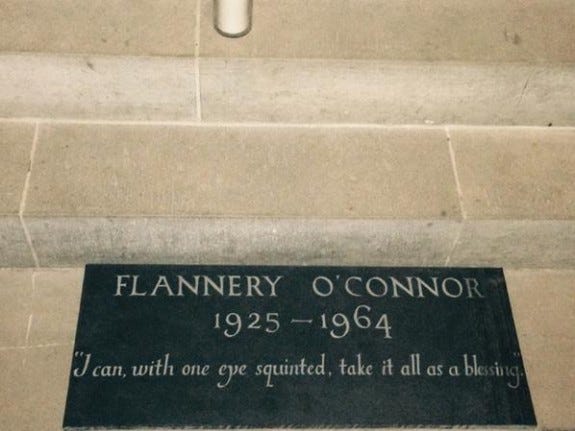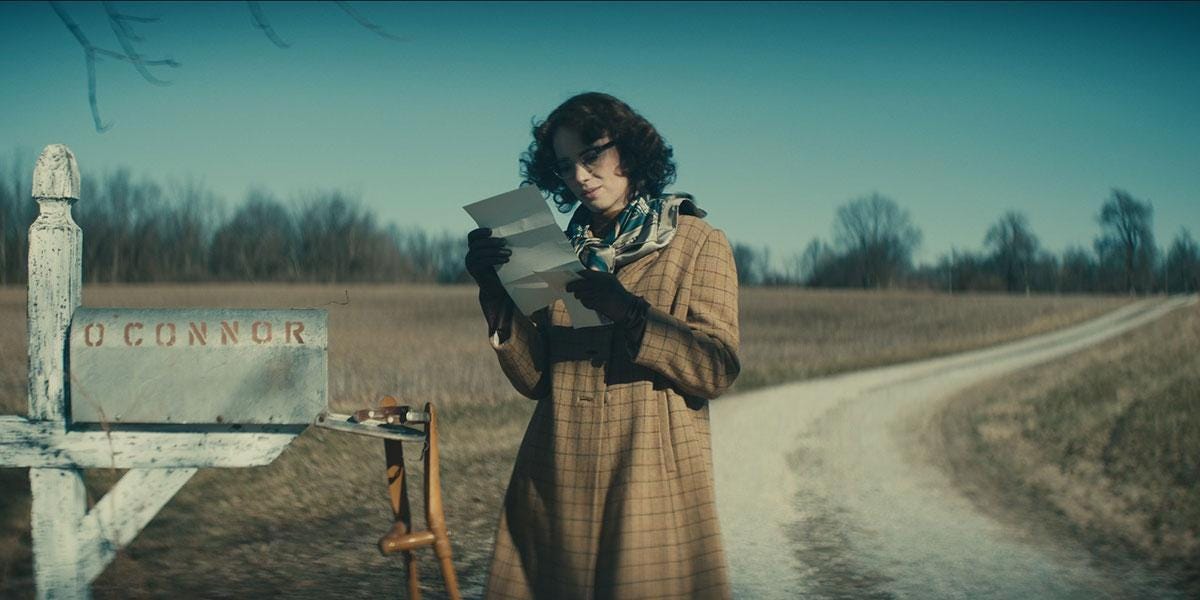Wildcat
Flannery O'Connor on the Big Screen
In a 1958 letter, Flannery O’Connor stated, “There won’t be any biographies of me because, for only one reason, lives spent between the house and the chicken yard do not make exciting copy.” She was right: traditional cradle-to grave biographies of O’Connor, even when they are well done, remind a reader of what Gertrude Stein said about Oakland, California: there’s no there there. O’Connor’s interior life saw the most action, but that’s the hardest kind of life to chronicle or make understandable for a reader. Many other writers have led lives that are far better suited for page-turners or cinematic treatment. O’Connor has been the subject of some fine documentaries, including Flannery and Uncommon Grace, but a documentary with professors speaking over stills of landscapes will never get a wide release.
Shelby Gaines and Ethan Hawke, however, remained undeterred in their mission to bring O’Connor’s writerly life to the screen and leveraged the latter’s star power to bring her to the highways and hedges. They have dodged the chicken yard challenge by avoiding the trappings of a traditional biopic: we get nothing of her childhood in Savannah and see O’Connor telling the story of her famous backwards-walking chicken instead of a recreation of that scene being filmed by Pathé News. We don’t have different actors play her at different ages, see her attend Georgia State College for Women, begin to publish, or die in Baldwin County Hospital. What we do get is a series of scenes that dramatize her struggles with writing, prayer, illness, and her mother–and the result of such experiences in her fiction. That’s why Wildcat succeeds. The scenes from O’Connor’s stories are almost always perfect realizations of what readers have imagined for decades: the segment dramatizing “Parker’s Back” is the best of the bunch, perfectly depicting that tattoo and Parker’s humiliation. And who would have thought that Greg Heffley’s father would make such a fine Mr. Shiftlet? But Wildcat most succeeds in dramatizing a writer’s desire to create something that can capture her relationship with God. Try putting that on the big screen.
Two friends of mine rolled their eyes when the film was first announced, out of an exhaustion with biopics, a disbelief that a movie could “get” O’Connor, and a suspicion that the film would present her through the lens of current mores. As someone who has studied O’Connor’s reputation and in light of attacks against it, I was a little worried, too. Would the Georgia author be refashioned into a California activist? To Hawke’s credit, that doesn’t happen, although he and Gaines have invented an exchange in which someone at a party tells O’Connor that she should avoid using racially offensive language in her stories. She responds with two lines from her letters, saying she wants to capture the ways people actually talk and that “the truth does not change according to our ability to stomach it.” Softening her stories would make them “propaganda” and “propaganda on the side of the angels only makes it worse.” This moment feels like an embedded disclaimer or insurance policy but it had to be included if they wanted to dramatize “Revelation.” Sanitizing Mrs. Turpin would undo the whole point of the story.
This method of transforming lines from O’Connor’s nonfiction into dialogue is how Gaines and Hawke reveal her values and assumptions. As a result, there’s a lot of Flannery in here: the on-screen O’Connor is like a Flannery mixtape that the writers created with all the enthusiasm of a high school kid in 1986 trying to get the song order just right. As someone who has been reading everything she’s written for most of my adult life, I kept noticing lines from her journals, letters, and essays spoken by her or other characters. They’re everywhere. (Orson Welles did the same thing when he wrote Moby-Dick, Rehearsed for the stage, having all the characters speak in out-of-order lines from the novel). Early in the film, we see John Selby, an editor at Rinehart, meeting with O’Connor and outlining his complaints about Wise Blood. When he asks her if she wants to hear specifics, she replies, “I am amenable to criticism but only within the sphere of what I am trying to do.” When he suggests she make an outline and try to tame the book’s weirdness, she says, “The finished book, though I hope less angular, will be just as odd if not odder than the nine chapters you have now.” Selby is meant to be regarded as someone who just doesn’t get it and O’Connor further responds to his criticism with, “I am not writing a conventional novel, and I think the quality of the novel I write will drive primarily from the peculiarity or aloneness, if you will, from the experience I write from.” All of her lines in this scene, meant to showcase her artistic independence, were never spoken aloud; they were written to Selby in 1949. Putting them in O’Connor’s mouth makes her more of a firebrand; since this is done throughout the film, she becomes something like a southern Samuel Johnson, summoning zingers from the heavens at just the right moment. When she’s told in person that her work is not to everyone’s taste, O’Connor mumbles a line from a letter, “You weren’t supposed to eat it.” She tells Robert Lowell, “I try to turn the other cheek but my tongue is always in it,” a remark made in a 1955 letter to Alice Morris. When told that writing must come easy to her, she responds, “It’s like giving birth to a piano sideways”—a big laugh line, but also not one of hers: in a 1957 letter, she attributes the line to someone else. And when Regina later complains that her daughter cares too much about her reputation and that “reputations don’t buy groceries,” the viewer is meant to see Regina as a philistine—but it was Flannery herself who said this to the critic Richard Gilman when he told her that her reputation was more important than royalties.
There are dozens of moments like this throughout the film, in which excerpts from her 1946-47 Prayer Journal and later letters, heard in voiceover, convey O’Connor’s inner life. “Dear God,” we hear, “I want to write a novel, a good novel.” When she lays in bed and speaks to a priest (Liam Neeson) about her suffering, she quotes the Prayer Journal: “I do not mean to be clever,” she tells him after making a crack about hell–but then immediately says, “Although I do mean to be clever on second thought and like to be clever and want to be considered so.” Sometimes the original lines are slightly edited for dramatic effect: the Prayer Journal’s “Don’t ever let me think, dear God, that I was anything but an instrument for Your story” is heard in the film as, “Let me be Your typewriter.” “Dear God, I can never seem to escape myself unless I’m writing,” a prayer heard in the film, is from a 1961 letter: “I never completely forget myself except when I am writing.” As she comes to terms with her new life on the first floor of Andalusia because she can no longer climb the stairs and sits at her typewriter with a spread of peacock feathers unfolding behind her, we hear her say about her illness, “I thought it would be the end of any creation … but it was only the beginning.” This is where Wildcat perfectly leaves us: the climax is not a book deal or montage of favorable reviews, but O’Connor’s acceptance that she can use her own suffering to inform her art. In lesser hands, the dreaded end-of-movie on-screen denouement credits would have read something like this:
Flannery O’Connor continued writing until her death in 1964.
Until her final moments, she was revising her stories in a notebook that she hid from her nurses.She was buried in Memory Hill Cemetery in Milledgeville, Georgia, next to her father, who died when Flannery was 16.
Regina died in 1995 at the age of 99. She was buried next to her daughter.
Instead, we get a passage from one of her letters, easy to miss since it comes after the credits have concluded and only the true fans are still in their seats:
“I owe my existence and cheerful countenance to the pituitary glands of thousands of pigs butchered daily in Chicago Illinois at the Armour packing plant. If pigs wore garments I wouldn’t be worthy to kiss the hems of them. They have been supporting my presence in this world for the last seven years.”
This is much more in-line with Flannery’s personality. I would have chosen, “I can, with one eye squinted, take it all as a blessing,” which combines O’Connor’s serious thoughts about her illness (“Sickness before death is a very appropriate thing and I think those who don’t have it miss one of God’s mercies”) with her sense of humor. That’s the quotation wisely chosen for O’Connor’s stone in the American Poets Corner at the Cathedral of St. John the Divine. But the pig joke at least captures her voice.
As for capturing the physical Flannery, Maya Hawke does this perfectly, even if what O’Connor called her “barbarous Georgia accent” and what Robert Giroux called “a dialect beyond instant comprehension” has been softened to make her more immediately intelligible for universal audiences. Her scenes with Regina (Laura Linney) are amusing because of her slow burn, yet her reaction to learning she has lupus and her inability to mount a staircase remind us that her toughness wasn’t constant. The film humanizes our image of her—and her vulnerability is exactly the part of her that many readers overlook when faced with the raw intelligence and ferocity of her writing. We see O’Connor stuffing her coat with copies of the New York Times or standing by her mailbox, reading a letter from Robert Lowell in which he announces his engagement to Elizabeth Hardwick and being again reminded that this entire realm of experience—romantic love—has been closed off to her. O’Connor was a person with all of the usual fears and insecurities, heightened because of her learning that she was facing the same imminent deadline as the characters in many of her stories.
As a Flan-Fan, I could quibble. How is it possible, I thought, that a collection of O’Connor’s work could almost wholly omit “A Good Man Is Hard to Find,” save for a few moments in the beginning? This seems like making a film about Thoreau without any scenes at Walden Pond. Why does Cooper Hoffman underplay Manley Pointer, who is supposed to strike the viewer (and Hulga) as the most empty-headed and innocent of good country people? How could a segment on “The Life You Save May Be Your Own” not include the end of the story in which Mr. Shiftlet picks up the young runaway and lectures him on morality? The filmmakers also cheat with the end of “Everything That Rises Must Converge”: the real shock of the story is not Julian’s mother’s dramatic comeuppance, but Julian’s “entry into the world of guilt and sorrow” for his smugness and superiority. That the dramatizations include Flannery and Regina is meant to suggest an autobiographical aspect to her work, but this seems too pat an implication for someone with O’Connor’s imagination. She certainly did know many Mrs. Turpins, but she would rather have sold a book than thrown one.
These sentences may sound like a litany of complaints, but they’re offered here as examples of how anybody making a film about a writer for whom her admirers have such devotion and strong opinions is already working against the odds. Like Red Sammy says in “A Good Man Is Hard to Find,” “You can’t win.” That Wildcat exists at all is a miracle.








Wonderfully written
Another great piece, fell in love with this quote “the truth does not change according to our ability to stomach it.”